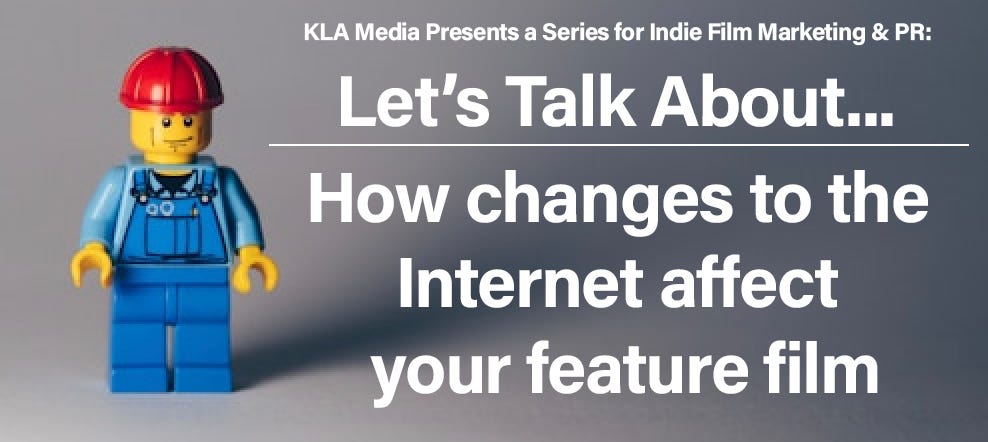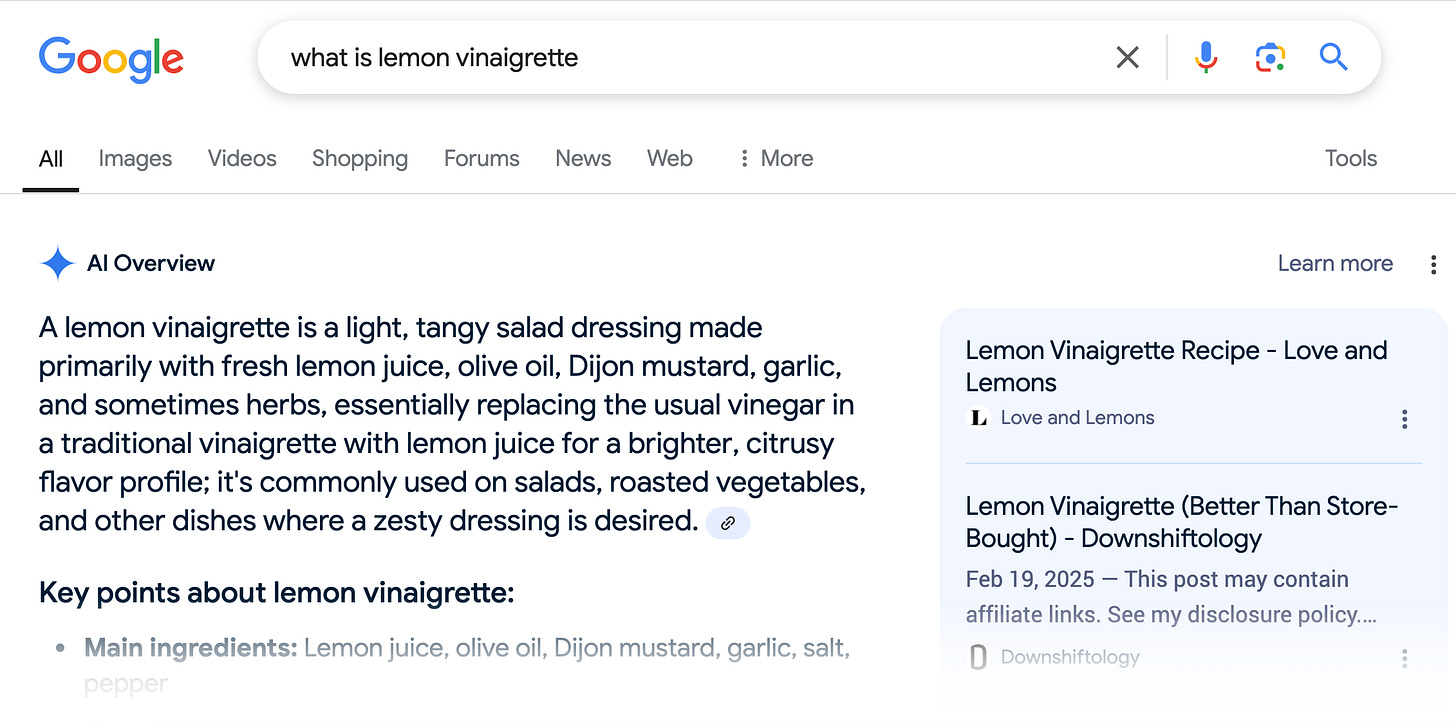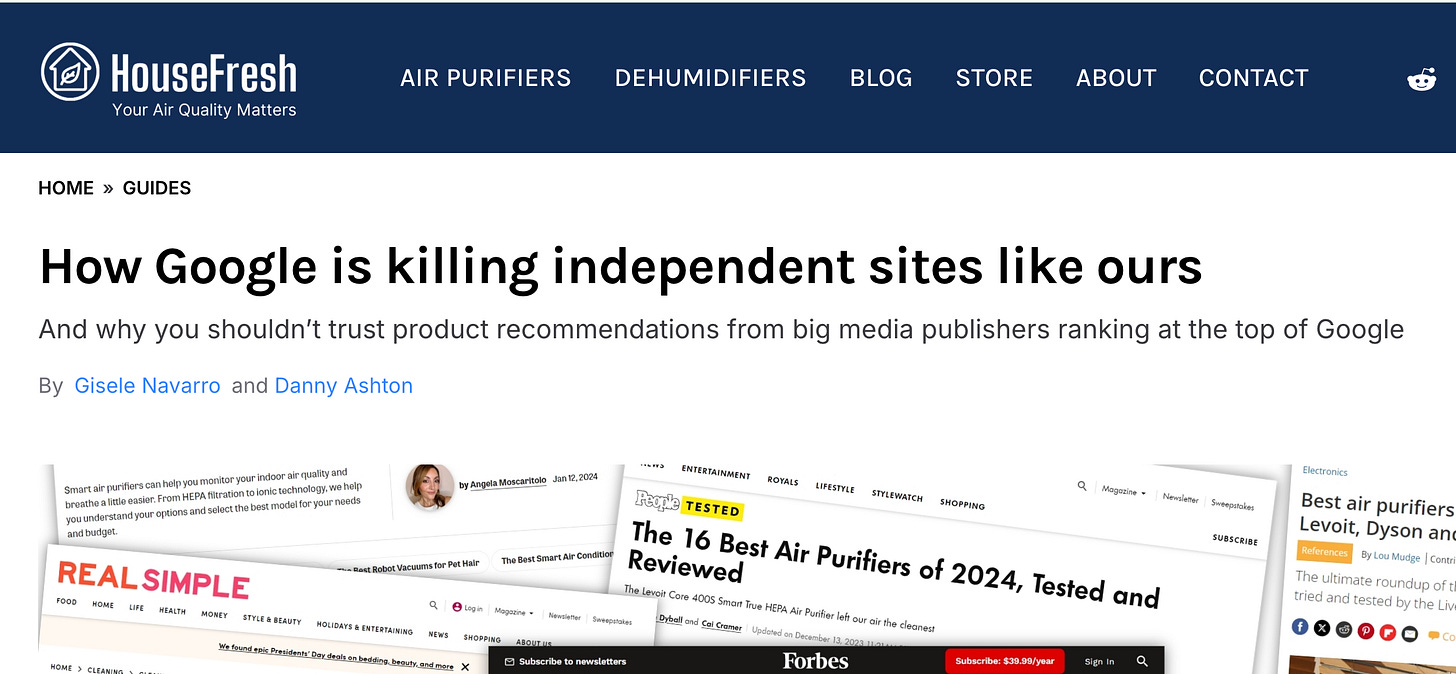Let's Talk About... how changes to the Internet affect your feature film. Google is scraping your content & killing traffic: it's now a walled garden for search. Also the politics of pockets.
This month's free post outlines how the Internet's relationship with users has changed & gives insight to how you should promote your indie film, underscoring why PR is more important than ever.
This month’s free post is designed to get people thinking out of the box a bit: I started this Substack in October of 2023 and I am truly appreciative of how it’s grown and connected people. But I’m especially grateful to have a place to share and organize all of the thoughts that tumble around my head and a place to connect with other thinkers, creators and doers, like you!
I’ll never be an influencer as I prefer to keep my social media profiles private and I never really took to Twitter so I’m especially grateful for a long form platform like this that allows me to dig deep into topics that I find relevant and interesting as a filmmaker, marketer and citizen of the world.
Funnily enough, I came across a study last week that highlighted how fans are saying they prefer long form content from creators versus short form content. I find this interesting because I’m a filmmaker and filmmaking consultant, and stats like these help inform my business decisions and aid my clients:
The study was authored by Patreon and while I always stress caution when reading studies as the results are always inevitably biased, here I think this is a relevant point as this Substack is dedicated to filmmaking, and film is long form.
You can read the whole report here.
There were a lot of nuggets in the study that helped shape the direction of this month’s post because it talks about how creators are learning that they don’t really own the relationship they have with fans on their platforms. I know the TikTok fiasco in January (which was a hundred percent a political stunt) was a main driver of discourse in January, but one thing that’s been slowly bubbling to the surface over the last 2-3 years are the changes that Google has made in its algorithm that basically no longer incentivizes websites to publish.
And this drastically affects search and how people use, view and trust the Internet.
I talk a lot about pop culture, tech and psychology on this Substack because all of those things are crucial when it comes to developing a marketing communications plan.
So today’s post is going to highlight something that I’ve seen a dramatic shift in over the last few years but I haven’t really had the words for yet. But I’ve uncovered some articles and podcasts that really helped give me the language I needed to do so and finally allowed me to write about it.
Essentially, all social media platforms and now Google, have become walled gardens.
And that hurts you as an indie creator unless you know what you’re up against and know how to make the most of it for you marcom plans.
But first, I want to shake things up a bit and get your mind running by breaking down something that you’ve probably never given two seconds of thought to: the pocket and specifically, the pocket on women’s clothing.
I do this to get your mind thinking about why things are the way they are and imagine how to either reshape their current reality or utilize the background of said item in an effective comms strategy for your film/book/music whatever.
The Politics of Pockets
I’m about today’s years old when I discovered that the pocket was actually rooted in past views of what spaces women were told they belonged in (the home). The lack of independence and responsibilities that restricted women in the past to the home led designers to assume that they did not need pockets. Men carried all the money, documents and keys: why build pockets into women’s clothing? Better to focus on the silhouette of the woman’s body, because that, after all, is what is important, right?
There’s two things at play here that I find interesting and therefore relevant to picking apart the current landscape for indie film.
The first is the assumption that pockets were unnecessary for women, who make up 50% of the population.
That’s a market that was ignored but clearly had a need for pockets because…
… the handbag global industry came up out of the need for pockets and is now valued at $64 billion dollars annually.
It’s important to understand why things are the way they are if we want to try and change them. Most women will tell you that not having pockets is really a pain in the butt, but that the allure of a handbag is a good enough tradeoff (these days) that we’ll deal with it.
There was a problem, a gap in the marketplace, and a brilliant response to it that created a whole other business enterprise.
So my question is… how can we look at the current marketplace for film, see how it got to where we are now, and find new ways to improve on it?
What problems currently exist, what “solutions” could be developed and what new markets can be created to meet demand and satisfy the consumers’ needs? Assuming that there are needs, and I’m going to assume that there are, because people have increasingly voiced their dissatisfaction with the “brain rot” pushed out by the studios, and independent film keeps claiming top awards (See exhibit A, Sean Baker with Anora at the Academy Awards).
That’s my deep thought for today and if you have any anecdotes you’d like to add, please post them in the comments or DM me privately.
I also wanted to point out that this hand sanitizer grew to over $100MM in revenue in 2024… so if a hand sanitizer can grow its revenue to over $100MM… why can’t indie film? I believe it can be done.
Google is a Walled Garden: How Changes in Search Affect Changes in User Behavior
As is becoming increasingly evident, people are realizing that building on a platform is a risky endeavor, because the platform can change at will or as we saw in January, be taken away.
What was once a really reliable source of web traffic was the simple, sturdy, trusty Google search. Big companies paid people like me and many others to beef up their SEO with content because search was king.
But no more.
Do a Google search for anything and you’ll see what I mean. In this case, lemon vinaigrette:
The first thing you’re getting in the search result is an AI overview of what lemon vinaigrette is. Google didn’t write this content however: it scraped it from another publisher’s website.
So once the search results pop up on the page, presumably the person searching no longer has any need to visit a page with the actual information, therefore eliminating traffic to that person’s website, and any ad or affiliate revenue.
And publishers (ie - website owners) are pissed about this.
Why wouldn’t they be? They built their websites for years with the understanding that by following Google’s best practices for search, they would be rewarded by higher rankings in search and a steady flow of traffic.
For a really great overview of how this has changed, check out this article.
Now, Google is not only stealing the content off of independent publisher’s sites, but scuppering traffic to their websites as well. Many websites are responding by paywalling their content so Google can’t scrape it.
Why do all of this hard work only to have it benefit Google alone?
But the ramifications of this are not limited to search. Think of the entire ecosystem of the internet and how it’s changed.
I rarely Google things these days apart from recipes and how tos.
So if search is being eliminated as a key driver of discovery for people, where are they going to get their information? And if there is no incentive for people to publish openly on websites, where is Google going to get the things it needs to feed AI?
Do you see the feedback loop problem here?
So if search is being eliminated as a key driver of discovery for people, where are they going to get their information? And if there is no incentive for people to publish openly on websites, where is Google going to get the things it needs to feed AI?
PR is More Important Than Ever & Community is Key
Click here to read the full article.
We’re in really strange times where we have a web where people don’t trust Google. I can’t speak specifically for Bing and other search engines but for over two decades now, Google set the norm on how people get and find information.
But that’s changed and marketers’ responses have to change with it. With AI, swarming (bogus reviews and recommendations) and junk websites, people no longer rely on Google to give them the search results they need. Sites have been gamed, algorithms hacked and really, who can say what’s what any more?
So where do we turn when we reliably need information or recommendations?
Community.
And this is why public relations is more important than ever for your films and your marketing and PR programs.
When I was starting out as a PR & marketing professional, I used to have to do something called “ad equivalency”. And that meant that I would have to measure the literal column inches we received in publications against the rate they would charge for the same amount of ad space as the article.
And the value of PR was valued at a 6X value that advertisements were, which helps illustrate how much more valuable and well-received PR is over advertising.
So think about how people get their information now and where recommendations from and focus your efforts on when building your audience and getting the word out about your film and stay tuned to this Substack for more marketing and PR tips for your indie film.
Today’s post is meant to stimulate conversation and get people thinking about things in new ways, because we all know, it’s not working any more.
If you’d like to work with me on your film’s PR or marketing campaign, shoot me an email!











